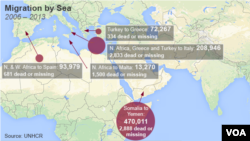Any doubts that Syrian refugee Dania harbored about paying human traffickers to smuggle her to Europe were erased with the gunfire that nearly killed her brother.
“He was working at a small stand selling things [in a refugee camp in Beirut] when two men walked up to him,” said the 21-year-old, who is of Palestinian origin but grew up in Syria before fleeing to Lebanon with her family in late 2012.
“They told him that they could kill a Lebanese Palestinian and it might cost them a bullet, but to kill a Palestinian Syrian refugee cost them nothing," she said. "Someone stepped in and there was an exchange of fire. My brother didn't have a gun and he didn't know how to use one.”
Her brother survived and the family moved away from the Shatlia camp in Beirut where the alleged incident took place, but for Dania — who requested that her full name and brother’s name be withheld for fear of reprisals — it made one thing clear: “I understand the risks [of being smuggled into Europe], but I don’t care,” she told VOA. “I’ll either make it or I won’t.”
The risks she speaks of are well-known. In September, more than 500 migrants, including Syrians and Palestinians, are thought to have drowned in an attempted crossing from Egypt to Italy after their boat was allegedly rammed by human traffickers.
While countless others have died trying to enter Europe illegally — the U.N. refugee agency (UNHCR) says more than 2,200 have died since June 2014, and migrant advocacy groups estimate some 20,000 have perished attempting to reach Europe by water over the past two decades — many are arrested en route.
But in a war that has caused an estimated three million people to flee Syria, it is expected that more will continue to attempt the perilous journey in search of a better life.
Providing vital support for refugees from Syria is proving increasingly difficult; last month a U.N. announcement that it would cut food aid for all Syrian refugees spurred a desperate last-minute fundraising drive that secured $80 million.
In Lebanon, which has a population of 4.1 million and at least 1.1 million refugees, the problem is particularly acute as the state struggles to cope. And for those Palestinians who have been doubly-displaced — first as historic refugees from what is now Israel, and then as a refugees from Syria — difficulties are compounded.
Chris Gunness is a spokesman for UNRWA, the U.N. agency dedicated to supporting Palestinians, and described the plight of Palestine refugees from Syria in the Middle East region as “becoming increasingly grave.”
Palestinian refugees already in Lebanon face restricted rights, while those arriving from Syria face the threat of deportation, as well difficulties being granted visas.
In September, while Lebanese authorities allowed Syrians the much-needed opportunity to extend expired visas by six months free of charge, Palestinian refugees from Syria were only given three months.
Acknowledging the “enormous effort” of Lebanon to support those fleeing the conflict, Gunness highlighted the return in May of 41 Palestinian refugees from Syria who were arrested at the airport for holding forged visas. He said, “Palestine refugees continue to have irregular status in Lebanon, which makes it difficult to access social services and receive civil documentation.”
“Closed borders and a series of forced returns from neighboring countries [to Syria]”, he added, were “driving an already vulnerable population to take life-threatening risks, such as attempting to escape by boat on the Mediterranean, often with tragic consequences.”
For Dania, who now earns a wage teaching after living illegally within Lebanon because of difficulties obtaining a visa, the rough treatment does not stop at the state level.
Driven from her home by airstrikes and mortar-fire near Yarmouk camp in Syria, a country in which she says her Palestinian identity was not a major issue, she spoke of the increased living costs that come with an influx of refugees and subsequent resentment she faced on a daily basis both from Lebanese and Palestinians based in Lebanon.
There have been a number of attacks on refugees in Lebanon, the incident involving her brother but one extreme example.
Such factors have already driven some 25 of her friends and family to pay to be smuggled into Europe, with traffickers often advertising openly on social media. Many of these journeys ended successfully, with some relatives finding sanctuary in Germany.
But not all. A friend of Dania’s uncle drowned off the coast of Libya, she recalls, explaining that although the details were unclear, she thinks he was with his family, and that they, too, died.
Now, despite her parent’s objections — “my father fears the smugglers, they are like mafia” — she plans to follow in their footsteps next summer. She even has a route in mind: return briefly to Syria before crossing into Turkey and then on to Greece, before finally catching a boat to Italy.
How she will finance the trip that could cost up to $5,000 remains to be seen, but she hopes family who have already made a new life in Europe will help with the financing.
Asked what scares her most about the journey, Dania is emphatic.
“Nothing. At the moment, this is not a life," she said. "I have to find the best option, and staying here is not the best option.”
If she makes it to Europe, she says, she would like to live in Germany or Britain, where her ambition would be to complete an education interrupted by the war.
But most of all, Dania wants to live legally and truly be part of society once again.
“I feel rejected all the time, and there’s no place to go," she said. "I want citizenship.”













